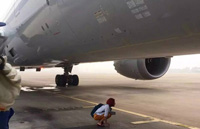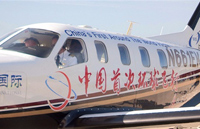Belt and Road Initiative has 'surpassed expectations'
By Tang Yue in Xi'an (chinadaily.com.cn) Updated: 2016-09-26 13:46The development of the Belt and Road Initiative has exceeded expectations and China is determined to strengthen the initiative, China's top publicity official said on Monday.
"Since the proposal of the initiative in 2013, the development has been fast and comprehensive. The speed and progress has surpassed expectations," said Liu Qibao, head of the Publicity Department of the Communist Party of China Central Committee.
"It takes time to deepen the understanding of anything new. After three years, the basic framework of the initiative is clear and we will work on more detailed and sustainable cooperation."
Liu was speaking at the International Seminar on the Belt and Road Initiative held in Xi'an, Northwest China's Shaanxi province, on Sept 26-27.
As of the end of June, more than 30 countries along the Belt and Road had signed cooperation agreements with China. China is also working with more than 20 countries on capacity building projects in the manufacturing sector, according to the Belt and Road Progress Research Team at Renmin University of China.
Among numerous major achievements, the Asian Infrastructure Investment Bank was founded on Dec 25, 2015, with its headquarters in Beijing and authorized capital of $100 billion. In June, it approved a $509 million investment in its first four projects in Bangladesh, Indonesia, Pakistan and Tajikistan.
In addition to economic and financial cooperation, Liu emphasized the importance of cultural exchanges and the appreciation of participating countries.
"The glamour of culture roots in variety. Only when we learn more about and truly appreciate each others' culture can we have deeper and more sustainable relationships," he said.
He said China expects to expand already-increasing cooperation in the fields of culture, tourism, media, sports and archaeology.
For example, the central government now offers about 10,000 government scholarships to students of the countries along the route every year, while some local governments have set up specific fellowships for the initiative. Meanwhile, more than 24 provinces and autonomous regions are cooperating with such countries on tourism initiatives.
The Belt and Road Initiative was first raised by President Xi Jinping when he visited Central Asia and Southeast Asia in September and October of 2013.
He proposed building the Silk Road Economic Belt, which essentially includes countries situated on the original Silk Road, through Central Asia, West Asia, the Middle East and Europe, and the 21st Century Maritime Silk Road, aimed at investing and fostering collaboration in Southeast Asia, Oceania and North Africa.
An international seminar on the Belt was held in 2014, followed by one on the Road in 2015. The event in Xi'an marked the first joint seminar, with three parallel sessions on media, think tanks and businesses.
- China training neurosurgeons as part of Belt and Road Initiative
- Official calls on media to support Belt and Road
- China releases remote sensing data on 'Belt and Road' environment protection
- Full text of keynote speech of China's top legislator at Belt and Road Summit in Hong Kong
- Belt and Road Initiative helps swell foreign student numbers
- World's largest telescope begins peering into space
- Air force in Pacific drill to test far-offshore strength
- Shanghai easing way for expat talent
- Tiangong-2 space lab enters preset orbit for docking with manned spacecraft
- First rapid response police unit 'fit',
UN says - Space lab begins tests in orbit, prepares for visit by astronauts
- Police, banks cooperate to fight telecom fraud
- Structure reshuffled to benefit environment
- Li: Beijing will open door wider
- Escaped fish put old species at risk











